R. Dr. Francisco Sá Carneiro
Zona Industrial de Bouro - Letra C
4740-010 Esposende, Portugal

Water Filtration Systems
Cleaning the solar panels can be a challenging task, as it is not always easy to achieve a thorough clean. Factors such as the location of the plant, the weather, even the soiling present on the panels or the quality of the water used for cleaning, all impact the effectiveness of the cleaning process. Moreover, even when everything goes well and what may seem like a perfect cleaning can quickly turn into a nightmare due to those water stains that are left on the surface of the panel after it dries.
What are these stains? They are minerals present in the water that is used to clean the panels.
These water stains can be a significant problem, as they can interfere with the functioning of the panels and impact their overall efficiency. The type of water used for cleaning is crucial to achieving a thorough and effective clean. Studies show that tap water is almost always unsuitable for cleaning solar modules, as it will leave behind mineral deposits that can form scale deposits, speed up the soiling rate and thus reduce the effectiveness of the panel. For this reason, it is recommended to use water with the least amount of impurities possible. And how is this possible? One way to achieve this is by using a mechanical water filtration system and the other is to add a softening agent to the water. Both will help reduce the water’s mineral content and prevent the buildup of mineral deposits. It’s important to ensure that the panels remain clean and functioning at optimal levels, maximizing the efficiency and productivity of their operations.
What are water filtering systems?
For solar panel cleaning, there are two main processes for water filtration: reverse osmosis and deionization.
Both systems use mechanical filters to remove particles from the water before it enters the process. This will reduce the stress on the consumables and lower operation costs. The water is first passed through a sediment or mesh filter, which removes larger particles such as sand and dirt. It can then passed through a carbon filter, which removes chlorine and other chemicals that can affect the quality of the water.
The reverse osmosis (RO) filter uses a semi-permeable membrane to remove dissolved solids and other impurities from the water. The RO filter removes up to 99% of the impurities in the water, leaving behind pure water that is ready for use in cleaning solar panels.
The deionization system uses a resin bed to remove ions and other impurities from the water, leaving behind purified water that is free of minerals and other contaminants. Deionization systems are particularly effective at removing minerals such as calcium and magnesium, which can leave streaks and spots on solar panels.
To achieve pure water (0 ppm of minerals), both processes can be used in series. First the reverse osmosis and the final step is the deionization.
Benefits:
- Improved solar panel efficiency: By using a water filtering system to clean solar panels, you can help to ensure that they are operating at their best, which can help to increase the overall output of your solar panel system.
- Reduced water usage: This type of system can increase the ability to penetrate soiling and grime, improving cleaning efficiency, and helps to reduce the total amount of water needed for cleaning, resulting in a reduction in water consumption.
- Enhanced environmental sustainability: by using pure water, you can help to minimize the release of pollutants into the environment and reduce your carbon footprint.
- Increased safety: Solar panel cleaning can be a dangerous task if it is not done properly. One potential danger is the risk of electrocution from working around live electrical components. However, using pure water for cleaning can increase safety by reducing this risk. Unlike tap water, pure water does not conduct electricity, making it a safer option for cleaning solar panels and reducing the risk of injury or electrocution.
Disadvantages:
- Cost: Water filtering systems can be expensive to purchase and maintain than traditional cleaning methods.
- Complexity: Some water filtering systems can be complex to install and operate, requiring specialized training and equipment.
- Maintenance: Water filtering systems may require regular maintenance and cleaning to ensure that they are operating at their best.
- Water waste: the reverse osmosis process will reject about 50% of the water being filtrated. On areas with limited access to water, this can have a significant impact.
It's important to carefully consider the potential advantages and disadvantages of using a water filtering system for solar panel cleaning before making a decision. In some cases, the benefits of using a water filtering system may outweigh the potential disadvantages, while in other cases, other cleaning methods may be more appropriate.
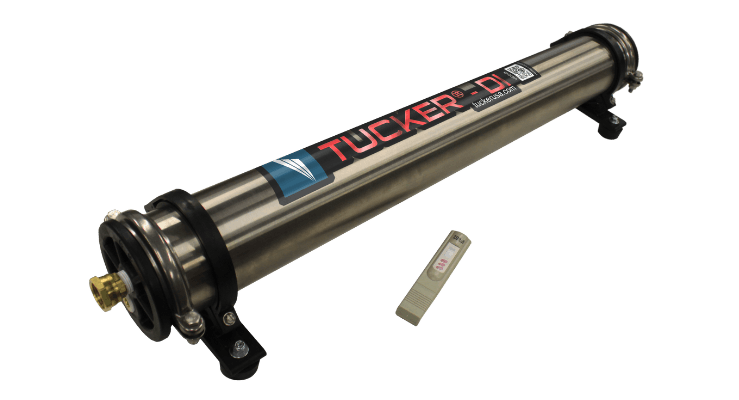
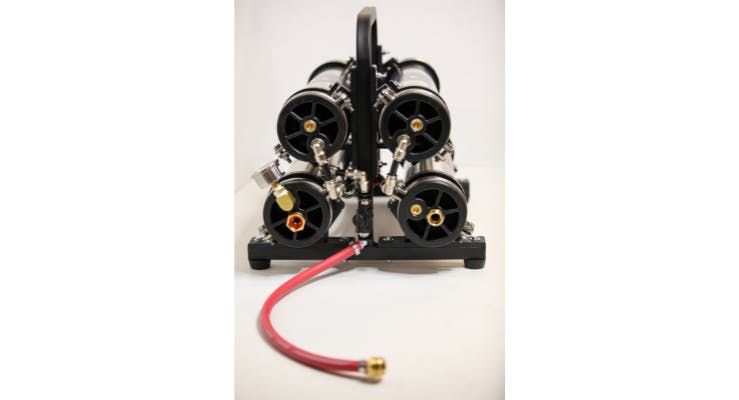
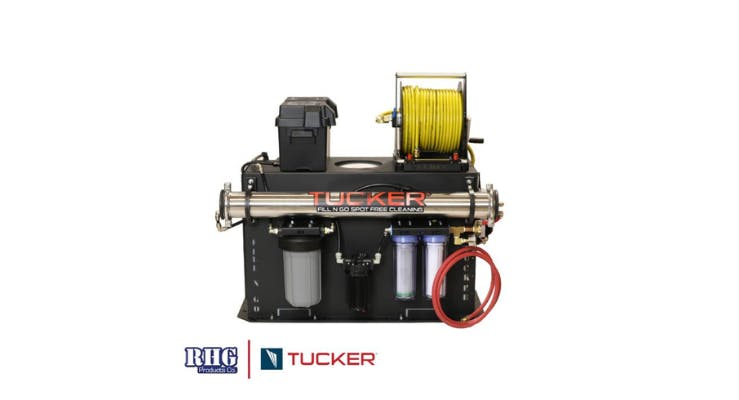
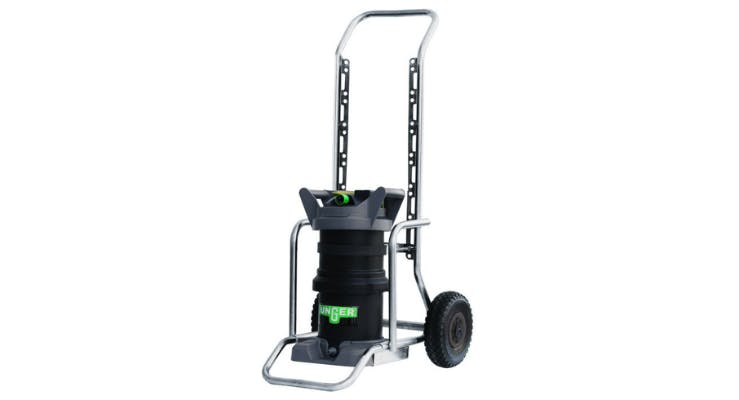
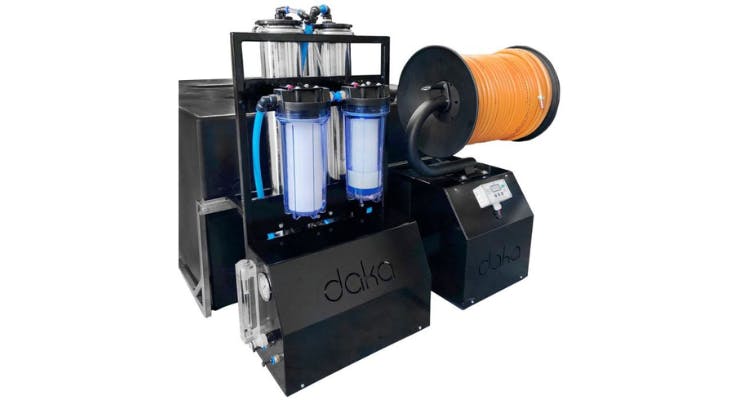
Tucker Deionization System
Single stage filtration system
Tucker Compact 4 Stage RO/DI System
High production RO/DI system that is short on space
Tucker Tank Based Reverse Osmosis and Deionization
Fill and Go - Single User
Unger nLite HydroPower DI-2400 Liter Filter
Unger HydroPower filters with a pure water outlet. This filters are provided with a resin filling.
Daka Black Box RODI PRO
The Black Box PRO telewash built-in unit and the RODI 3000 filter unit
What are water softening agents?
Water softening agents are substances or processes used to remove minerals, particularly calcium and magnesium ions, from hard water. Hard water contains high levels of these minerals, which will cause scaling and buildup on the surface of the PV modules.
Benefits:
- Simplified water logistics: specially on large scale plants, avoids the need of buying demineralized water or having onsite water filtration that will require time and additional manpower. Allows the use of closer water sources which can then be treated onsite with the simple addition of the softening agent.
- Less investment and maintenance required: avoids the need to invest in expensive filtration equipment and its consumables.
- No water waste: there is no water waste associated with the use of softening agents unlike the reverse osmosis.
Disadvantages:
- Requires the use of water tanks so that the softening agent can be added and given time to capture the minerals. This can be specially limiting for smaller cleaning companies that focus more on residential and C&I.
The choice of system of water treatment or water softening agents will depend on the specific needs of the solar panel cleaning operation, including the type of contaminants that are present in the water, the level of purity required, and the volume of water that needs to be filtered and even the budget available, as some types of water purification systems are quite expensive.
Chemitek Water treatment solution:
WSA is a readily biodegradable softening agent for hard and very hard water, specifically developed for the solar cleaning industry. It will capture the mineral ions in the water thus preventing the appearance of limestone stains and deposits, left by hard water, after cleaning.
It is added directly in the cleaning water and takes 15 to 20 minutes for the capture process to occur. It has been tested by TÜV Sud, confirming that it does not affect the aluminum structure, silicone, or the ARC of the PV panels.
Specially on large scale plant, it will simplify your water management and prevent the need of investing in expensive filtration systems and consumables.
Do you have any suggestions or topics about the solar industry you would like to read here? Reach us by email!



